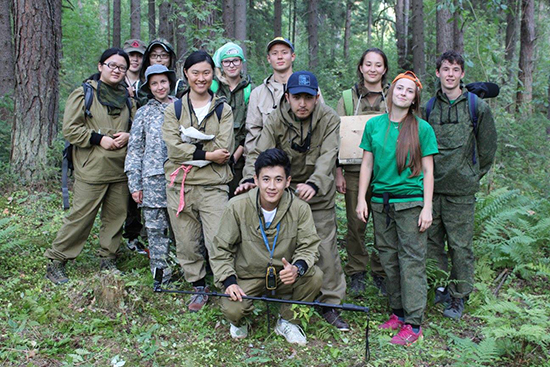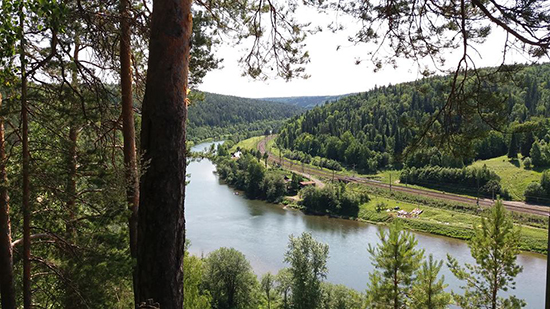Students' Feedback
Gonzalez Santana, St Edmund Hall, 3rd Year MEarthSci Earth Sciences
WORK PROJECTS
Our first project involved a two week field trip to Siberia, during which we visited different types of mines (e.g. coal, molybdenum, gold, asbestos, marble) and collected gold samples from alluvial sediments via gold panning for analysis in the lab upon return to the host university. The host organisation had planned all the transport to, from and within Siberia and provided most of the material we needed (e.g. tents, stove, wellies, protective suits...). They also provided a translator, as we were travelling with a group of Russian Geology students and explanations were given to them in Russian. Back at the university, they provided us with the necessary lab equipment to analyse our samples so that we could later write a report about our findings. We had two more trips, a short two day trip to an ar-chaeology site, during which we helped out in the excavation process, and a 10 day geophysical trip. The latter was organised by SEG (Society of Exploration Geophysicists) and provided invaluable experience in the field of Geophysics by allowing us to undertake a full survey of a karst area (the project was called Karst Scene Investigation). We had a chance to work with seismic, gravity, magnetic and electric data that we had collected ourselves. All of this was once again organised by the host university and included transport. Meals were also provided during the last two trips.
DAILY LIFE
This internship was so varied that we rarely spent over a week doing the same thing. We were all given accommodation in the university halls of residence so I shared a room with my two friends who were doing the same geology internship as me. During the first week we had some introductory lectures and Russian lessons. We would get to university for 10am, have lectures, go for lunch in the canteen and then have Russian lessons. In the evenings we did a bit of sightseeing, sport and went for walks. The host university organised some trips on Saturdays as well as a city tour, so we got to meet the other Oxford interns who were here for their different subjects. During our field trips, we were living with Russian students. It was a great opportunity to get to know more about the culture and meet new people. We would usually be busy during the daytime but have time to socialise and relax by the campfire in the evenings. Our last week was spent writing up a report, which meant we had more of a fixed routine. We still had time in the evenings to play beach volleyball, try out antigravity yoga and meet up with friends we made on our trips.
This internship was so varied that we rarely spent over a week doing the same thing. We were all given accommodation in the university halls of residence so I shared a room with my two friends who were doing the same geology internship as me. During the first week we had some introductory lectures and Russian lessons. We would get to university for 10am, have lectures, go for lunch in the canteen and then have Russian lessons. In the evenings we did a bit of sightseeing, sport and went for walks. The host university organised some trips on Saturdays as well as a city tour, so we got to meet the other Oxford interns who were here for their different subjects. During our field trips, we were living with Russian students. It was a great opportunity to get to know more about the culture and meet new people. We would usually be busy during the daytime but have time to socialise and relax by the campfire in the evenings. Our last week was spent writing up a report, which meant we had more of a fixed routine. We still had time in the evenings to play beach volleyball, try out antigravity yoga and meet up with friends we made on our trips.
LASTING IMPRESSIONS
Arrival to Russia was accompanied by a slight culture shock. I had expected it to be different to Western Europe and the UK but arriving in a city where no one spoke English was hard at first. Regardless, I managed to settle in fast and the city and the people grew on me throughout my time in Perm. Towards the end of my eight weeks, it started to feel like a second home. This experience has helped me confirm that I want to pursue a career in the field of Geophysics. I really like Russia and would love to return later in life, however, I think the climate is a bit too extreme for me to consider living or working here for prolonged a period. I am very glad I came on this internship as I had the chance to travel to places in Russia I would not have gone to otherwise.
Arrival to Russia was accompanied by a slight culture shock. I had expected it to be different to Western Europe and the UK but arriving in a city where no one spoke English was hard at first. Regardless, I managed to settle in fast and the city and the people grew on me throughout my time in Perm. Towards the end of my eight weeks, it started to feel like a second home. This experience has helped me confirm that I want to pursue a career in the field of Geophysics. I really like Russia and would love to return later in life, however, I think the climate is a bit too extreme for me to consider living or working here for prolonged a period. I am very glad I came on this internship as I had the chance to travel to places in Russia I would not have gone to otherwise.
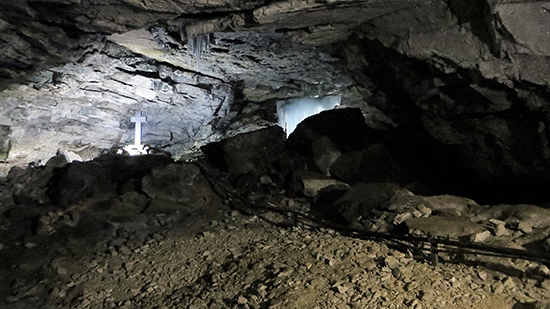
Annabel Wood, St Hugh's College, 3rd Year MEarthSci Earth Sciences
WORK PROJECTS
Firstly we attended a lecture course on Stratigraphy and Palaeontology, and had Russian language lessons over the course of a week. Then we went on a geology fieldtrip with PSU Geology students to Siberia, Khakassia and Tyva Republics, to look at various mines and quarries, and to pan for gold. When we returned from Siberia we began to analyse our gold samples. We then spent three days at an archaeology dig, and then returned to Perm for a few days before going on a Geophysics field survey with SEG (Society of Exploration Geophysicists) in Predralye, funded and taught by SEG. After returning to Perm we spent time in the PSU laboratories analysing our gold samples and writing a report about what we found in Siberia.
Firstly we attended a lecture course on Stratigraphy and Palaeontology, and had Russian language lessons over the course of a week. Then we went on a geology fieldtrip with PSU Geology students to Siberia, Khakassia and Tyva Republics, to look at various mines and quarries, and to pan for gold. When we returned from Siberia we began to analyse our gold samples. We then spent three days at an archaeology dig, and then returned to Perm for a few days before going on a Geophysics field survey with SEG (Society of Exploration Geophysicists) in Predralye, funded and taught by SEG. After returning to Perm we spent time in the PSU laboratories analysing our gold samples and writing a report about what we found in Siberia.
DAILY LIFE
Daily life was very variable due to the fieldtrips. The first week we spent in Perm, and attended lectures and classes as you would normally at university. Then we joined Geology students from PSU on a field trip to Siberia, where we spent the days travelling by bus to visit various mines and quarries. During the nights we camped at various campsites, and had to pack up and set up camp several times. On our second field trip to an archaeological site, we also camped and spent the days digging in the site. On our third fieldtrip to Predralye, we stayed in small wooden huts with beds, and every day would travel to the mountain above Kungur Ice Caves and undertake our geophysical surveys. In the evenings late afternoons we spent our time processing this data. When we returned to the university, we did some laboratory work to analyse gold samples that we had obtained from Siberia, and then worked together to write a report about this gold. We got to the university by a 10 minute walk from our accom-modation. We socialised with Russian friends who we met on our various trips, and also with other Oxford internship students. Out of work we visited restaurants, went to the beach by the Kama River and walked around the city.
Daily life was very variable due to the fieldtrips. The first week we spent in Perm, and attended lectures and classes as you would normally at university. Then we joined Geology students from PSU on a field trip to Siberia, where we spent the days travelling by bus to visit various mines and quarries. During the nights we camped at various campsites, and had to pack up and set up camp several times. On our second field trip to an archaeological site, we also camped and spent the days digging in the site. On our third fieldtrip to Predralye, we stayed in small wooden huts with beds, and every day would travel to the mountain above Kungur Ice Caves and undertake our geophysical surveys. In the evenings late afternoons we spent our time processing this data. When we returned to the university, we did some laboratory work to analyse gold samples that we had obtained from Siberia, and then worked together to write a report about this gold. We got to the university by a 10 minute walk from our accom-modation. We socialised with Russian friends who we met on our various trips, and also with other Oxford internship students. Out of work we visited restaurants, went to the beach by the Kama River and walked around the city.
LASTING IMPRESSIONS
This internship showed me Russian culture and what it is like to live in Russia. My lasting impressions of this internship are that everyone is so friendly and willing to help. I do not think I would return to Russia to live or work, but definitely would return to visit.
This internship showed me Russian culture and what it is like to live in Russia. My lasting impressions of this internship are that everyone is so friendly and willing to help. I do not think I would return to Russia to live or work, but definitely would return to visit.
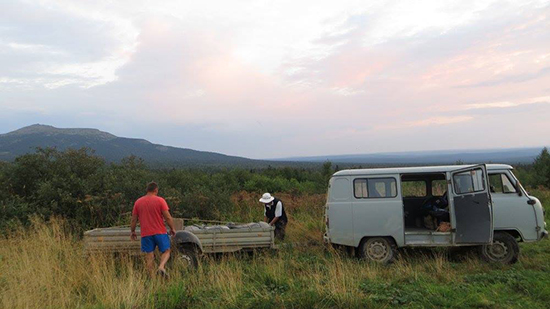
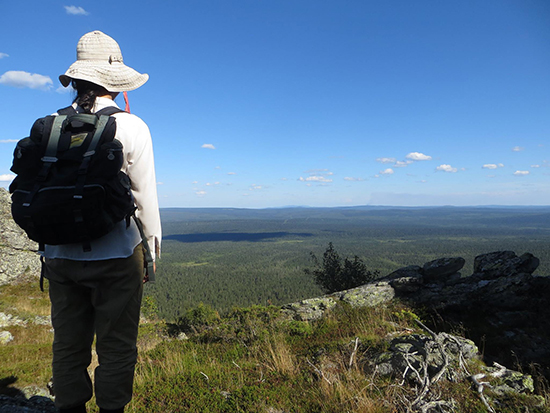
Caroline Haworth, St Anne's College, 3rd Year MEarthSci Earth Sciences
WORK PROJECTS
During the first week of the internship we undertook a course on the regional palaeobiology and stratigraphy and had basic Russian lessons. We then took part in a two week field trip to the regions of Khakassia and Tuva in southern Siberia. This field trip was with some of the 2nd year Geology students of Perm State University. We visited mines and mineral deposits and collected gold samples via river sediment panning. Later in the internship we analysed these gold samples with an electron microscope and wrote a report on the samples' composition and morphology. We undertook a second field trip during this internship where we took part in the Society of Exploration Geophysicists' summer camp to the Kungur Ice Caves. During this summer camp we used multiple geophysical methods to search for a potentially undiscovered cave. I thoroughly enjoyed this internship. It was a great way to experience Russia.
During the first week of the internship we undertook a course on the regional palaeobiology and stratigraphy and had basic Russian lessons. We then took part in a two week field trip to the regions of Khakassia and Tuva in southern Siberia. This field trip was with some of the 2nd year Geology students of Perm State University. We visited mines and mineral deposits and collected gold samples via river sediment panning. Later in the internship we analysed these gold samples with an electron microscope and wrote a report on the samples' composition and morphology. We undertook a second field trip during this internship where we took part in the Society of Exploration Geophysicists' summer camp to the Kungur Ice Caves. During this summer camp we used multiple geophysical methods to search for a potentially undiscovered cave. I thoroughly enjoyed this internship. It was a great way to experience Russia.
DAILY LIFE
When we were based in Perm we generally had 4 hours of lectures in the morning/early afternoon or worked on our report. Our accommodation was located a 10 minute walk off campus. During the field trips we generally left camp at 9am for the day. In Siberia there was a lot of travel by bus between mines and we regularly changed campsite. On both field trips we socialised in the evenings with the other students on the trips and met up with some of these students when we were back in Perm. We also socialised with the other Oxford interns and the translators from Perm State University. Our daily life was very varied depending on the project or field trip we were involved in.The field trip to Siberia was amazing and the views were awe-inspiring.
When we were based in Perm we generally had 4 hours of lectures in the morning/early afternoon or worked on our report. Our accommodation was located a 10 minute walk off campus. During the field trips we generally left camp at 9am for the day. In Siberia there was a lot of travel by bus between mines and we regularly changed campsite. On both field trips we socialised in the evenings with the other students on the trips and met up with some of these students when we were back in Perm. We also socialised with the other Oxford interns and the translators from Perm State University. Our daily life was very varied depending on the project or field trip we were involved in.The field trip to Siberia was amazing and the views were awe-inspiring.
LASTING IMPRESSIONS
I thoroughly enjoyed this internship. It was a great way to experience Russia. I met some lovely people and it showed me that students are basically the same in every country. The field trip to Siberia was amazing and the views were awenspiring. I would love to visit Russia again in the winter to see the snow. This internship has given me a potential interest in a career in mineral exploration.
I thoroughly enjoyed this internship. It was a great way to experience Russia. I met some lovely people and it showed me that students are basically the same in every country. The field trip to Siberia was amazing and the views were awenspiring. I would love to visit Russia again in the winter to see the snow. This internship has given me a potential interest in a career in mineral exploration.
